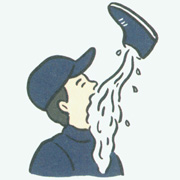|
Pokey Araya posted:Depending on how warm it is where you live/how warm its going to get, I would check the coolant, and make sure the radiator fan works. Also check to see how the brakes are before you start taking out of the neighborhood, nothing worse than getting up to 50 and realizing the brakes suck and/or don't function. Otherwise I think you're on the right track. goddamnedtwisto posted:Also check the tyres for cracks and bulges, and maybe consider changing them even if they look good. 3 years is about the limit that most can be left without being moved before you absolutely should change them so you're running it pretty close. I definitely will. Looking at the intruderalert.com, the members recommend Avon Venoms, but I'm not sure if Avon is a reliable company. Ill probably go with Dunlop D404s. Edit: it seems like Avon is reliable. Rabid Snake fucked around with this message at 07:39 on Apr 2, 2013 |
|
|
|

|
| # ? Jun 5, 2024 23:18 |
Rabid Snake posted:Thanks for the advice. My dad replaced the rear brake shoes and front pads before he let it sit for awhile (he only rode it for a month before his arthritis made it impossible for him to ride anymore). Should I still replace these items since its been sitting for awhile? I'll probably drain and replace the front brake fluids for good measure anyways. Ill definitely check the coolant/radiator fan now that you mentioned it. 1. No, they'll be fine. 2. Yes do the fluids. 3. Avon is decent, the only anectode I have is a friend had avon qualifiers on his vtr1000 and the grip was insane.
|
|
|
|
|
Rabid Snake posted:My parents have a 2001 Suzuki Intruder VS800 that's been sitting around for awhile. The last time it was started up was 2 and a half years ago. I was thinking about selling my 1980 Yamaha XS400, which runs perfectly fine, in order to fix up this Intruder. My parents are going to give it to me for free since my Dad does not ride anymore. I like using the XS400 to drive around the city but it kind of struggles on the interstate highway. I rode a buddies intruder 800 for about a month in the 90s when my car was in the shop. It was a decent bike and you'll probably be happy with it. Do as the others mentioned, tires and lubricants. Carbs will probably be the biggest problem. I also wouldn't worry about a tach unless you have a big erection for one. They are very happy burbling around at low RPM and I doubt you'll ever want it rev it high enough to want a tach other than just playing as the engine runs out of steam fairly low... and if you do the ear tach will work fine for you.
|
|
|
|
Rabid Snake posted:My parents have a 2001 Suzuki Intruder VS800 that's been sitting around for awhile. The last time it was started up was 2 and a half years ago. I was thinking about selling my 1980 Yamaha XS400, which runs perfectly fine, in order to fix up this Intruder. My parents are going to give it to me for free since my Dad does not ride anymore. I like using the XS400 to drive around the city but it kind of struggles on the interstate highway. Why sell the Yamaha? I don't know what shape it's in cosmetically, but it seems to me you've just been handed a "own a reliable bike AND a fun bike to futz around with" situation on a silver platter.
|
|
|
|
In general, is it better to pay someone to do a bunch of maintenance and then sell a bike (2005 CBR600F4i with over 35k miles on it), or should I sell the bike with all the bits I bought for it that I never had the time or inclination to actually put on? It needs an oil change for sure (sat all winter, oops), new battery, new chain, new sprockets, air filter, brakes probably, and who knows what else. I have everything on that list but the brakes and oil sitting in our garage with the bike. As an aside, I'm thinking pretty hard about moving across the country for graduate school this fall. Anyone want my bike? It's awesome and I love it, but I don't want to spend the money to maintain it (or on more safety gear), and I don't want to leave it in the garage here in El Paso for my husband to deal with if we move or rent/sell the house or whatever. Tell me your thoughts. Buy my bike.
|
|
|
|
It's hard to give a tangible answer to that. If you're listing it on the high end hoping to get the most for it then you'll probably need to make it a 'needs nothing' bike to not get bargained down too bad. If you're putting it in the mid to low of what you've seen them sell for I don't think you'll need to bother doing anything but making the ad. People are generally bad at figuring out total cost. I've seen my 2k listing scoffed at by people and shown 'bike hasn't run in 10 years' listings for $500-$1000 less as an example of why I'm asking too much. Sticker price is the only factor for a lot of buyers, but certainly not all of them.
|
|
|
|
Halo_4am posted:It's hard to give a tangible answer to that. If you're listing it on the high end hoping to get the most for it then you'll probably need to make it a 'needs nothing' bike to not get bargained down too bad. If you're putting it in the mid to low of what you've seen them sell for I don't think you'll need to bother doing anything but making the ad. Thanks, that seems fair. I kind of want to have all the parts gone too, so maybe I'll just pay to have the work done.
|
|
|
|
Ghost Cactus posted:In general, is it better to pay someone to do a bunch of maintenance and then sell a bike (2005 CBR600F4i with over 35k miles on it), or should I sell the bike with all the bits I bought for it that I never had the time or inclination to actually put on? The real question is how much money do you want out of it? Someone who's willing to do their own work is going to want a deal, even if the parts are included, but you'll probably spend just as much on getting someone to do the chain, sprockets, filter, etc. No one's going to buy the bike and not take the parts. I'd probably just get it running - get the battery charged and installed, check the brakes and that it goes and stops, list it as needing those things and coming with them and that should maximize price to effort ratio for you. Can probably get away with listing it for just a little bit under the top end, as filter, chain, and sprockets shouldn't be more than a few hundred bucks to have a shop handle everything, or 2-3 hours for a skilled amateur mechanic.
|
|
|
|
Ghost Cactus posted:It needs an oil change for sure (sat all winter, oops) Does it really matter if a bike sits all winter with 'old' oil in it? I doubt it, especially for synthetic. I'd be inclined to just follow the maintenance interval, claims like 'it turns acidic!' reek of bike forum hearsay to me, but maybe I'm being too skeptical. Heck, the oil in my transmission is 5 years old by now, though it's not exposed to exhaust gases.
|
|
|
High Protein posted:Does it really matter if a bike sits all winter with 'old' oil in it? I doubt it, especially for synthetic. I'd be inclined to just follow the maintenance interval, claims like 'it turns acidic!' reek of bike forum hearsay to me, but maybe I'm being too skeptical. Yes, it does matter. It isn't really that it turns acidic, it's that condensation builds up in the crank case. I've seen cars which havent had the oil changed in a couple of years without moving; you would swear the head gasket has a slight leak when you take the oil cap off. This is why every manufacturer everywhere stipulates that you change your oil at a certain mileage or a certain time, irrespective of mileage. Trans oil isn't really the same as it doesn't have to deal with exhaust gas or petrol and isn't exposed to atmosphere.
|
|
|
|
|
That oil sat in the ground for a hundred million years before it got into your bike; it doesn't change in the slightest unless it's exposed to heat and pressure (like in a running engine). Claims like "it turns acidic" are bullshit. If you store the bike long enough without running, though, other things like water are going to eventually get in, and without heat the boil the moisture out on a regular basis it'll build up and start to rust things. I assume that's why people thing old oil turns corrosive. That said, oil is cheap and an oil system that isn't working right will cause catastrophic damage to the engine, so it can't hurt to change it. Sagebrush fucked around with this message at 19:47 on Apr 2, 2013 |
|
|
|
Z3n posted:The real question is how much money do you want out of it? Someone who's willing to do their own work is going to want a deal, even if the parts are included, but you'll probably spend just as much on getting someone to do the chain, sprockets, filter, etc. No one's going to buy the bike and not take the parts. Makes sense. I want at least $3k, but motorcycles in this town usually sell for more than ones in similar condition do elsewhere. Probably something to do with being next to a huge Army base. I'll get it going again, make a part pile for pictures, and then list it. Thanks for the advice.
|
|
|
|
Slavvy posted:Yes, it does matter. It isn't really that it turns acidic, it's that condensation builds up in the crank case. I've seen cars which havent had the oil changed in a couple of years without moving; you would swear the head gasket has a slight leak when you take the oil cap off. This is why every manufacturer everywhere stipulates that you change your oil at a certain mileage or a certain time, irrespective of mileage. Sure, and of course changing it won't hurt, but will it really build up enough condensation to hurt in one winter? Especially if you just go for a long ride and warm it up properly afterwards. In any case, the moisture issue would suggest it's best to do the oil after storage, not before. Unfortunately none of my bikes' maintenance manuals ever specified an oil change time (as opposed to mileage) interval (sample size of 2).
|
|
|
|
Dumb question, but, if I'm about to change the chain on my bike, is it totally necessary to change the front and rear sprockets as well? Or is this just a good recommendation(appx. 14,xxx mi. on original chain and sprockets)?
|
|
|
High Protein posted:Sure, and of course changing it won't hurt, but will it really build up enough condensation to hurt in one winter? Especially if you just go for a long ride and warm it up properly afterwards. In any case, the moisture issue would suggest it's best to do the oil after storage, not before. Put it this way: it's bad enough that car manufacturers worry about it; bike engines are much more sensitive and fragile so yes, I would change the oil. Especially seeing as it really doesn't cost that much. I've never seen the point of changing the oil beforehand though. edit: as for the oil change intervals, I think that the expectation is that no one would ride the bike so little as to fail to accumulate x miles in x time so they didn't put in a time interval. Alternatively, the owners' manual will say somewhere that if you don't meet the mileage requirements to change the oil at x time anyway, and it just isn't part of the normal schedule. Sagebrush posted:That oil sat in the ground for a hundred million years before it got into your bike; it doesn't change in the slightest unless it's exposed to heat and pressure (like in a running engine). Claims like "it turns acidic" are bullshit. If you store the bike long enough without running, though, other things like water are going to eventually get in, and without heat the boil the moisture out on a regular basis it'll build up and start to rust things. I assume that's why people thing old oil turns corrosive. This is a hilarious line of reasoning. From now on I'll answer every argument about material degradation with 'it sat in the ground since the inception of a solid earth so sitting on your front lawn won't hurt it at all!' EZipperelli posted:Dumb question, but, if I'm about to change the chain on my bike, is it totally necessary to change the front and rear sprockets as well? Or is this just a good recommendation(appx. 14,xxx mi. on original chain and sprockets)? I'd get the wheel up off the ground and check for tight spots. Also look at the sprocket teeth and judge their wear/possible curvature etc. I've heard you can do two chains to one set of sprockets but it really depends on how you ride, what sort of bike it is etc etc Slavvy fucked around with this message at 21:02 on Apr 2, 2013 |
|
|
|
|
Sagebrush posted:That oil sat in the ground for a hundred million years before it got into your bike; it doesn't change in the slightest unless it's exposed to heat and pressure (like in a running engine). Claims like "it turns acidic" are bullshit. What? Just because it sat for millions of years in the ground doesnt mean it did so in any form that might be good to put in an engine. You do know that they dont just pump oil straight out of the ground into 1L oil bottles, right? Also, oil getting acidic isnt just bullshit. Things happen to oil while it is used in your engine, hence why you need to change it. It wont get acidic just sitting, at least not for a looooong time, but it does get acidic with use http://www.kewengineering.co.uk/Auto_oils/oil_degradation.htm The real moral of the story is dont store your bike with used engine oil, as its the used oil that can get acidic
|
|
|
|
Yes, I know that refined engine oil isn't anything like crude oil. I was being facetious. My point was that a clean, non-reactive heavy hydrocarbon like an oil doesn't break down just sitting around for a couple of years on a shelf -- if it's still sealed, a bottle of oil you dug out of the dump would perform basically as well as an equivalent new oil with the same set of additives. If you had changed the oil in your bike and then immediately put it in temperature- and humidity-controlled storage without even starting it up, I see no reason that the oil inside the crankcase would "go bad" just from sitting in an aluminum container instead of a plastic one. As I said and you also pointed out, it's running the oil in the engine that degrades it, turning it slowly from nice clean oil to a bunch of toxic reactive breakdown products. I could easily see *that* oil becoming acidic from dissolved metals or whatever. I don't think anyone is arguing that old, burnt-up oil is bad for engines. Slavvy posted:This is a hilarious line of reasoning. From now on I'll answer every argument about material degradation with 'it sat in the ground since the inception of a solid earth so sitting on your front lawn won't hurt it at all!' Well, if your bike was made of a pile of ore-bearing minerals, it would be true e: I have no idea how any of this applies to synthetic oils, man-made affronts to God that they are
|
|
|
|
Slavvy posted:Yes, it does matter. It isn't really that it turns acidic, it's that condensation builds up in the crank case. I've seen cars which havent had the oil changed in a couple of years without moving; you would swear the head gasket has a slight leak when you take the oil cap off. This is why every manufacturer everywhere stipulates that you change your oil at a certain mileage or a certain time, irrespective of mileage. Just take it out for an hour and it'll boil the water out of the oil. A winter isn't going to hurt it. The only slight caveat I'd add to that is if you've turned your oil to mayonnaise (that is, the oil and water have emulsified, leaving something that looks frankly a little Japanese porn-looking on top of the oil) with multiple short trips, enough to mix the water in but not to boil it out, that this can lead to a quite surprisingly fast loss of oil as the mix, as it boils, will take a lot of oil out with it too. The bigger risk of storing a bike with really old oil, IMO - especially non- or semi-synth - is that, like petrol, it can separate if left undisturbed long enough, which can suck the nastiest, sludgiest bits right up the oilways when you do turn it over. It takes dozens of years to happen with new oil but old, cheap oil can do it pretty quickly. Still not over the course of a winter though.
|
|
|
|
I think in general the importance of the type of oil, how you treat it etc is severely over-stated on the internet in general and this forum is no exception. Using the right grade and changing the oil around the right time are definitely important but what kills most engines is people being idiots, caning the bike when it's cold or doing standstill burnouts or simply having too low or high an oil level.
|
|
|
|
|
EZipperelli posted:Dumb question, but, if I'm about to change the chain on my bike, is it totally necessary to change the front and rear sprockets as well? Or is this just a good recommendation(appx. 14,xxx mi. on original chain and sprockets)? Take a look at the sprocket points. If they are pointier than you remember them starting out as, then yeah go ahead and change them. If you're the second or later owner and you've never changed them, go ahead and assume the previous owners did not maintain their things properly and change them out. The rule of thumb I've been told many times is that you change your sprockets when you remove the second chain they've had on them. If you're really nice to your chains this doesn't always necessarily apply, but it's a decent rule to go by. What you really don't want to do is run a new chain on worn old sprockets, they will kill it in a hurry. e: another way to gauge sprocket wear is to look at the amount of "cupping" that has developed in the transitions between the valleys and the peaks. Take a look at a brand new one and see the curvature of the transition, then look at yours. If yours is looking more like one of the vert ramps from the X-games rather than a cross-section of a pipe, then it's likely time to change them out. Sprockets are pretty cheap unless you're getting crazy racing-grade stuff, so it's not too painful on the checkbook to err on the side of caution if you're unsure. Worst thing that happens if you change them too early is you've got a spare to roll around on in case you break a tooth. Kilersquirrel fucked around with this message at 22:00 on Apr 2, 2013 |
|
|
|
Slavvy posted:I think in general the importance of the type of oil, how you treat it etc is severely over-stated on the internet in general and this forum is no exception. Using the right grade and changing the oil around the right time are definitely important but what kills most engines is people being idiots, caning the bike when it's cold or doing standstill burnouts or simply having too low or high an oil level. I wish someone would tell Aprilia that. If there's a way of getting the right amount of oil into any of their engines, I've yet to find it. You see the sightglass only applies if the bike is absolutely level - putting it on a paddock stand is enough to drop the level from full to half-empty, and even if you do manage it the glass only applies to hot oil, not cold. Warming the engine up takes the level from the bottom line to half-way to the top. Oh, and running the engine drops the oil entirely out of the glass, and the difference between the two lines is about 50ml, or roughly the amount of oil in your funnel. All this, of course, has to be done with your eye six inches off the ground and your hand over your head to pour the oil. (Conventional wisdom is to just fill it to the top line and let the excess go out of the breather, which saves you the effort of oiling your chain for a few hundred miles too, as the breather exits (via the airbox) onto the chain. Gives you that authentic classic bike oil spots on the ground look, too. I know over-filling is as dangerous to the engine as under-filling, but apparently the margin is far wider on Aprilias at least)
|
|
|
|
Slavvy posted:I think in general the importance of the type of oil, how you treat it etc is severely over-stated on the internet in general and this forum is no exception. Using the right grade and changing the oil around the right time are definitely important but what kills most engines is people being idiots, caning the bike when it's cold or doing standstill burnouts or simply having too low or high an oil level. Agreed, especially on the warming up part. The way I see people start a cold bike and just tear out of there, pegging the limiter... I always gently warm it up, even if that means sticking to the slow lane for a bit.
|
|
|
|
High Protein posted:Heck, the oil in my transmission is 5 years old by now, though it's not exposed to exhaust gases. In your XB? Have you at least looked at it? First time I checked mine, it was a disgusting emulsified mess. It's stupid-easy to check and change, too, mine gets changed every time I do engine oil.
|
|
|
High Protein posted:Agreed, especially on the warming up part. The way I see people start a cold bike and just tear out of there, pegging the limiter... I always gently warm it up, even if that means sticking to the slow lane for a bit. Having pulled apart a bunch of engines, every time I go over 5k with the engine still cold I have nightmare visions of the piston scuffing that always seems to occur. Here's a question: what's worse for my bike in terms of warm up; idling it until it's reasonably warm or riding it straight away? Normally it's a no-brainer, but my route to work puts me on the motorway roughly 500m from my house so the temperature is barely 100 degrees by the time I'm doing 5500rpm at just over 100km/h and it feels SO BAD FOR IT.
|
|
|
|
|
On carbed bikes I idle until the throttle isn't blubbery and then ride away. On FI bikes I idle it for maybe a minute and then drive away. Keep it easy on the engine for a while and then go ahead. I figure the cylinder is warm enough from friction alone that it's probably ok after a couple seconds. I think the key point is not being an idiot and redlining the bike with cold oil and coolant still kicking around. I do live in a climate that is 85 degrees+ for a lot of the year. It was always fun on the R6 to see the temp gauge show 104 degrees from almost the instant I turned it on in the summer
|
|
|
|
|
Slavvy posted:Having pulled apart a bunch of engines, every time I go over 5k with the engine still cold I have nightmare visions of the piston scuffing that always seems to occur. I'm less concerned with RPM than I am with loading it up cold. Usually I idle it until it settles, then ride it easy until I can feel heat from the rear cyl on my junk, then I know it's ready to dong around.
|
|
|
|
Where can I buy parts for an old bike (84 Honda Trail 110) online? Previously I have been using Bike Bandit but does anyone have any other suggestions?
|
|
|
|
ebay?
|
|
|
|
NorskHotDog posted:Where can I buy parts for an old bike (84 Honda Trail 110) online? Previously I have been using Bike Bandit but does anyone have any other suggestions? My parents have a couple Trail 70s, they can be tough to find parts for. Had to resort to random websites and Chinese knockoff parts several times especially on tires.
|
|
|
|
Are throttle tubes pretty much a standard part? I'm swapping out my bars and grips, but I'm having a hell of a time trying to pull the old right grip off the old tube. It's kind of yellowed anyway and looks like it might crack. Could I just pick up a regular $8 Motion Pro replacement tube instead?
|
|
|
|
Is the yellowing just old glue? You can just use a razor blade to cut the old grip off. Use some sandpaper to remove the score marks if you're worried about it later but in my experience it doesn't hurt anything.
|
|
|
|
|
I'm asking this on behalf of a friend who doesn't have the privilege of an SA account She's looking to buy a used motorcycle. She rides scooters but has never had a motorbike before. Doesn't know very much about them. I bought my first motorbike last summer, which is also when I took the MSP class. I don't know very much about them either, but having been through this before and done a little maintenance on my own, I know a little more than her. We have both read this useful guide to checking out used bikes. Considering getting this 1981 Honda 650, which comes with a windjammer, and she plans on taking off the windjammer. 1. How easy would taking off the windjammer be? I imagine it's not too hard. 1a. Can you re-sell a windjammer? Or are they generally pretty specific to the bike? 2. I've read the advice before that I shouldn't get an older bike for my first bike, cause they're just more prone to problems, and having to fix lots of weird problems on your very first bike sucks. So this bike is older (1981), but also has very few miles on it (11k). Does this advice still apply? Or should she still consider this bike despite its calendar age? Thanks for the help! Y'all were very helpful to me last year when I was shopping; I ended up very happy with my bike.
|
|
|
alnilam posted:I'm asking this on behalf of a friend who doesn't have the privilege of an SA account You'll get two responses here. One camp will say that having an ancient bike is awesome because you have to fix everything, it'll be your pride and joy and you'll learn to love it etc etc. The other camp will tell you that having an ancient bike is horrible because you have to fix everything, rides like poo poo, parts are hard to find, it's finicky and sensitive and maintenance-intensive. My 2c: buy something you aren't concerned about dropping. Don't PLAN on dropping it, but it's safer to err on the side of caution and get a bike that isn't too precious and shiny for your first one. If you're asking how difficult it is to remove a windjammer, it doesn't sound (correct me if I'm wrong, I'm just assuming) like you're very mechanically confident, in which case newer is generally better. Old bikes being easy to work on etc is all wonderful when you know what you're doing but nothing beats modern materials, low mileage, no rust or age or previous owner bullshit.
|
|
|
|
|
Yes windjammers can be resold. If your'e asking how to remove it, don't buy the bike. That's a .. uh.. acid test. On the order of "I am scared to change my fork oil."
|
|
|
|
Slavvy posted:If you're asking how difficult it is to remove a windjammer, it doesn't sound (correct me if I'm wrong, I'm just assuming) like you're very mechanically confident, in which case newer is generally better. I'm fairly mechanically confident in general, though I am new to motorbikes in particular. I just have no idea what a windjammer is, is all. Should have googled it before posting "can I remove a windjammer," but I didn't, sorry. When I said I believed it was probably easy, I was assuming it's an aftermarket fancy windshield with music poo poo in it that probably connects to the battery, which sounds easy to remove. Only concerns were that I don't know how/if it affects the handlebars (are the handlebars swapped out to special "WindjammerTM Handlebars" to accommodate it?), and I didn't know if windjammers are specific to particular models of bike due to handlebar dimensions. All this because I have never seen a Windjammer before, because I have never wanted one or given a poo poo about one.
|
|
|
|
I understand what you're saying, but the very link you posted even says WINDJAMMER right on it.  IIRC, they were fairly universal with fit kits. They are not attached to the handlebars and IIRC the OEM bars would be used so you shouldn't have to worry about that. They do tap into the wiring for the headlight and signal lights, but nothing that shouldn't be reversible... although the OEM signal lights for the front will almost certainly be gone (and need to be replaced) and you will also probably need some small hardware bits for the headlight. I have zero clue what, if anything, you could get for one now as they are not exactly sought after. So I guess to answer your question: Difficult? No. Worthwhile? Hard to say.
|
|
|
|
The windjammer has a plug that is spliced into the existing wiring. When you remove the windjammer you can just reconnect the stock headlight/turn signals (original wiring and plugs should be there), and just leave the WJ plug dangling inside the bucket if you want. They are not universal, though. The metal bracket that connects the WJ to the bike was made by whatever manufacturer had licensed them, but fun fact: the jig for that bracket was made by the Vetter fairing Company by hand for each model, then the jigs themselves were sold to the manufacturer for construction. This means that there are almost no measurements or directions for the model-specific brackets, and if you really want a WJ fairing (don't know why you would, but there are people out there...), the bracket itself can go for way more than the fairing, because the fairings fit many models but the brackets don't. If your downtube is at a different angle or has a different diameter (or is a double vs a single, etc), then the bracket you have may put the fairing at a funny angle or render it unusable. Most Windjammers were installed right over the factory stuff by a dealer, so you may or may not have the complete headlight and fixings behind the fairing; on the last bike I removed one from, the turn signals were gone, but the headlight itself was complete with bulb and I just had to plug it in. And, before you ask: Yes, most were attached with basic hose clamps from the factory.
|
|
|
|
There was exactly one good thing about Windjammers: The headlights. They were often Bosch lenses with H4 bulbs, at a time when many manufacturers were still using goofy sealed beam designs. The headlight bucket is also really nice, using a ratcheting mechanism to hold the bucket ring on, requiring no tools to remove the lens and light. I ran a windjammer headlight on my Bandit and I cant picture a better light for cheaper.
|
|
|
|
Would anyone be able to tell me what the distance between the two mounting holes on a late model (09-13) Yamaha R1 is in MM? From eyeballing them, they look like a near bolt-on replacement for my current rearsets, but I want to measure to make sure. Thanks!
|
|
|
|

|
| # ? Jun 5, 2024 23:18 |
|
So if my girlfriend and I wanted to go to Europe, get some motorcycles, and tour through various countries, what should we look for? It seems like bikes are pretty expensive to rent; if I wanted to get a pair of bikes for a whole month, are there any better options? Borrowing from goons?
|
|
|































